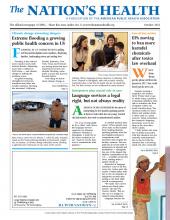Police racism against Black Americans was condemned, protested and catalogued long before officers killed George Floyd on the streets of Minneapolis in May 2020. But the horror of Floyd’s murder — coupled with the stress, fear and uncertainty of the COVID-19 pandemic — drove outrage to a new level for many, spawning a national movement against racism and injustice.
A new book from APHA Press examines how systemic and structural racism — including mistreatment by police and others in power —have fueled health inequities for Black Americans. “Health Equity: African Americans and Public Health,” spotlights the ways psychosocial, sociocultural, political, commercial and economic determinants continue to shape the health of the population.
While the nation has far to go in closing the gaps in health status between white and Black Americans, the current presidential administration’s embrace of social justice in the wake of Floyd’s death is helping to move the needle, according to Daniel Dawes, JD, the book’s co-editor.
“I do believe that we are in a remarkable period, because we have a government that has never before centered health equity to the degree it has, especially at this federal level, and is as committed to moving as far upstream to addressing the political determinants of health,” he told The Nation’s Health.
Dawes and the other editors — Kisha B. Holden, PhD, MSCR, and David Williams, PhD, MPH — along with other top public health scholars, contribute to the book’s chapters. Topics include the stigma that Black people often experience when seeking help for mental health and behavioral problems, as well as ways to improve mental health equity, service access and utilization.
With racism in health care known to affect the health of Black Americans, the book offers actionable metrics to evaluate racial equity in hospitals as well as in public health and clinical programs.
A look at political determinants of health underscores the importance of civic engagement as a path toward health equity. The goal is to understand not only how politics fueled racial injustices, but also how political participation, policymaking and voting can improve racial and health equity.
Authors also dive deep into determinants of health, highlighting how they reinforce one another to create a web of harm to health equity.
“Other books talk about them, usually in silo,” Dawes said. “We’re bringing them together in a manner that will directly help readers understand the implications on the African American community.”
The new book underscores that now is the time to act on health equity.
Advocates need to “leverage this period of time that we’re in today, to ensure that we’re doing all that we can to create a more equitable society for every region,” Dawes said.
Attendees at APHA’s 2023 Annual Meeting and Expo can meet Dawes and other APHA Press authors during book signing events. Copies of “Health Equity: African Americans and Public Health” and other APHA Press books will also be available for purchase.
For more information on the new book and to learn about other titles in APHA’s health equity series, visit www.aphabookstore.org.
- Copyright The Nation’s Health, American Public Health Association









